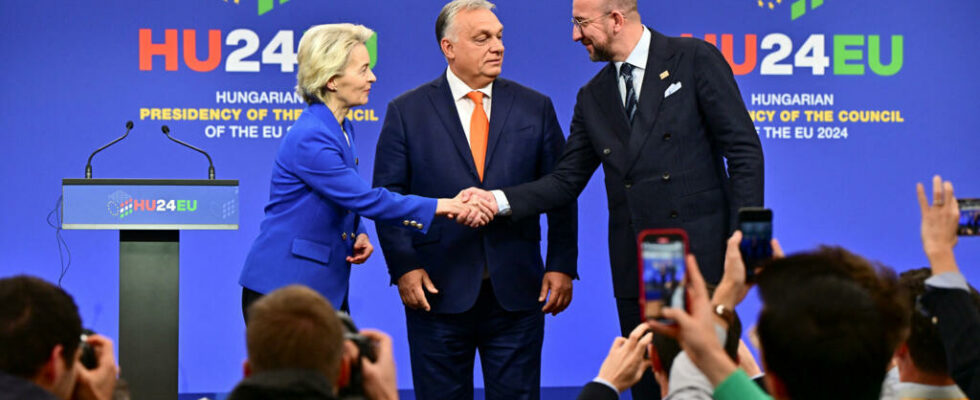Following on from the European summit in Budapest, the European Council held in the Hungarian capital on Friday, November 8, resulted in a joint declaration of intent. Although it did not result in binding decisions, the 27 members of the European Union (EU) moved forward on a plan to revive European competitiveness, inspired by Mario Draghi.
3 mins
This informal European summit produced a text that was minimal and which lost substance, going from 9 to 4 pages, reports our special correspondent in Budapest, Carlotta Morteo.
Hungarian Prime Minister Viktor Orbanwho chaired this informal summit, noted the obvious: “ On competitiveness, we all agree, no one wants to manage the decline of Europe “. But from there to agreeing on the remedies, there is still a long way to go. The President of the European Council, Charles Michel, who is preparing to end his mandate, for his part considered that the content of Friday’s conversations showed a certain sense of urgency to act.
Among the main proposals, the Budapest declaration of the 27 mentions several points. First, the European Union (EU) is planning a simplification shock, to reduce bureaucracy for businesses by 25%.
In addition, the European Commission is committed to presenting an industrial policy in the coming months. Its president, Ursula von der Leyen, proposes setting up a special regime for innovative start-ups. This regime would allow more than 180,000 small and medium-sized European businesses to access the single market in a simplified manner. An objective has also been set: to achieve, by 2030, 3% of GDP in investments in research.
The challenge of the green industrial pact
It also seems that leaders are moving forward with the idea of building a Savings and Investment Union. This is to make it possible to use European savings to invest in sectors of the future.
Based on a 400-page report written by the former president of the European Central Bank Mario DraghiUrsula von der Leyen promised to propose “ in the first 100 days » of its mandate a green industrial pact to support the decarbonization of industry. “ Mario Draghi launched a clear call for a European revival. Europe needs fundamental modernization to remain competitive », Estimated the German Chancellor Olaf Scholz.
EU leaders acknowledged “ the urgency of decisive action », taking up the main ideas put forward by Mario Draghi. According to a warning from the former Italian Prime Minister, economic reforms have become ” even more urgent ” with the election of Donald Trump in Washingtonthe US president-elect having promised to tax imports of European products to reduce the EU’s trade surpluses.
But differences of opinion remain profound on many subjects, notably the origin of the financing to be mobilized. Mario Draghi estimates the necessary investments in the Old Continent at between 750 and 800 billion euros per year, more than the United States Marshall Plan which supported the reconstruction of Europe after the Second World War. This investment wall is an immense challenge for the 27 EU countries, as they try to reduce their debt and budget deficits.
European leaders remain vague on this subject on budgetary issues. They recognize that it will be necessary to mobilize “ both public and private funding » and claim to want “ explore all instruments and tools », a controversial mention which sparked lengthy discussions. Germany and other countries frugal » in fact exclude any recourse to new common debt, despite the success of the historic post-Covid-19 recovery plan of 800 billion euros initiated in 2020. They could, however, consider public financing via the European Union budget or increased recourse to the European Investment Bank.
(and with AFP)
